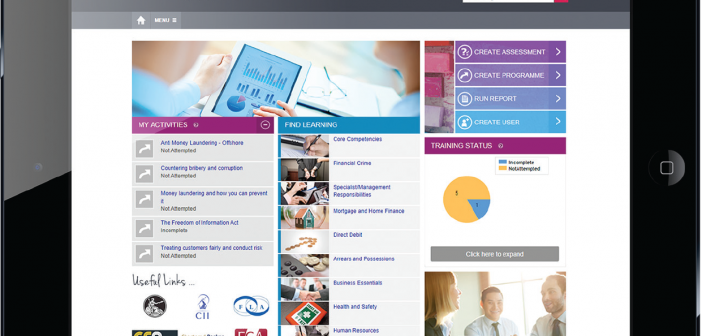In 2013 the government signalled a tougher Training and Competency (T&C) regime for regulated financial firms, with the new independent regulatory bodies of the FCA and PRA having wider powers than their predecessor, the FSA.
Earlier this year firms received yet another reminder of just how the FCA was prepared to flex its substantial muscle with the introduction of two new pieces of regulation, Consumer Credit Regulation and Mortgage Market Review, which further tightened market regulations.
The FCA’s own website states: “Our training and competence (TC) regime helps to support our consumer protection objective. It aims to ensure that customers in the regulated financial services markets deal with firm employees who are competent.”
This aim can only be achieved when regulated firm employees really understand how and why the issues around consumer protection and Treating Customers Fairly (TCF) are so critical, and can effectively apply on the “shop floor” the knowledge they have acquired, through professional qualifications, training and CPD.
The need to bring about the changes in culture and behaviours required to be compliant in this environment, and the demand for a training approach that does not treat T&C and compliance as a short-term ‘tick box’ exercise, have not suddenly emerged with the arrival of the FCA, of course.
There has been a welcome growth over the past five years in the adoption of ‘Academy-style’ learning and development platforms that combine libraries of high-quality learning assets with advanced diagnostic, content creation, and management tools
The political fallout in the wake of the 2008 banking crisis was not confined to major culprits in investment banking and hedge funds, but has led to a public demand for more transparency and demonstrable ethical behavior across the financial sector.
As a result, tighter regulation and conduct of business guidelines are a reality for financial advisers and were the initial drivers of a renewed energy to be seen to “do the right thing” by the customer.
The good news for firms is that traditional training solutions supporting standardised supervisory models have been on the wane for several years. Replacing them are technological innovations helping firms manage their ‘new’ T&C needs effectively as part of the wider, holistic requirement to uphold professional standards focused on customer experience and the culture, ethics and professionalism of firms.
The rise of Academy-style learning
There has been a welcome growth over the past five years in the adoption of ‘Academy-style’ learning and development platforms that combine libraries of high-quality learning assets with advanced diagnostic, content creation, and management tools.
The three key areas of T&C that all firms need to consider under FCA regulation are assessing competence, maintaining competence and record keeping.
An online Academy can help regulated firms embed ethical behaviour by combining the essential rigour of high-quality core compliance and regulatory content with a robust learning management and reporting infrastructure and the flexibility to reflect their firm’s own culture by tailoring learning to job role and individual needs.
Client demand for mobile learning in line with 21st century lifestyles, has led to the emergence of Apps that can deliver bite-size chunks of learning on tablet devices or smartphones to provide point-of-need performance support, with CPD recording syncing back to the platform.
Apps can also counteract the ‘forgetting curve’, the process by which information is lost over time following a training intervention, if there is no regular reinforcing activity. Instead of the once a year “sheep dip” compliance training, you can push short regular bites of learning, tests and refreshers to the mobile device.
One leading UK retail bank has really placed the idea of personalised learning journeys and career pathways at the heart of its T&C scheme, and its resulting Academy is a major success story that is helping the bank enjoy undisputed, measurable business benefits, with a model that can be easily embraced elsewhere.
Staff are embracing opportunities for learning through personalisation, new technologies, faster deployment of learning materials, better quality content, including via Unicorn’s user-friendly, mobile-ready authoring tool, eCreator, and role development opportunities.
The features being utilised to create the required personalisation include managing F2F training, online learning and assessment (own and third party content), wiki authoring, integrated data feeds, online content authoring (eCreator), video integration and live webinars.
The features individually are not unique, but how they have combined to deliver an effective blended learning and compliance solution for new starters and key groups of workers, is.
The upgraded Academy is attracting increased numbers of employee visits, with site visits doubling in the first three months after the launch to over 18,000 per month, combined with longer learning sessions, with a three-fold increase in the number of page views.
Users are visiting key site areas above and beyond mandatory regulatory training, so exceeding the measureable objective targets. Most notably, and reflecting this engagement, customer approval ratings have soared during a time when UK banks have been arguably at their least popular.
Breaking it down
The scalable, flexible nature of the Academy solutions being developed ensure that assessing competence, defined by the FCA as “having the skills, knowledge and expertise needed to discharge the responsibilities of an employee’s role,” including achieving a good standard of ethical behaviour, can be tailored to individual knowledge gaps and specific job roles aided by built-in diagnostic tools.
To address the area of maintaining competence, the benefits of a flexible Academy again comes to the fore, and there are two especially relevant points here.
Firstly the FCA states firms must not only consider changes in the marketplace and in products, regulation and legislation, but also consider the skills, expertise, technical knowledge and behaviour of an employee, and their ability to apply these practically.
In-built tools such as the eCreator can enable a firm’s own subject matter experts to edit and update content directly, which is particularly important in a landscape where regulation and legislation can change often and at short notice. The most recent example of this is the subject of international sanctions where events in the Middle East and Eastern Europe require content to be updated rapidly.
A significant innovation is that eCreator courses can be created and edited on a mobile device such as an iPad. The eCreator’s central content syndication capability also plays a major role in rapid and consistent content deployment.
Finally, there are specific CPD requirements for firms undertaking retail investment activities spelled out in the RDR. Firms are required to assess the competence of their employees on a regular basis, as well as continue to assess employees’ training needs, and recording CPD is central to this.
That is why we developed our CPD mobile App; you can find the CII version ‘MyCPD’ free in the Apple and Android stores.
This enables individuals to record offline CPD activities, complete their reflective statement and upload data, including evidence such as photos taken on a device’s own camera, which syncs back to the platform to update their central CPD record.
When it comes to the FCA’s record keeping requirements, reporting functionality within platforms is more advanced than ever, while the creation and ongoing development of reporting APIs can ensure the successful integration with other HR platforms and in-house systems and enable seamless data exchange and the secure movement of business critical information around an organisation.
The ability to configure a platform to reflect each client’s own brand and values adds to the holistic sense of T&C being achieved within the wider context of nurturing cultures of ethical behaviours and professionalism, not in isolation to it.
Conclusion
While a platform solution incorporating an effective T&C scheme is not a guarantee there will be no breaches of regulations or worse, the gravity of sanctions, not to mention the accompanying reputational damage, illustrate that any solution which is effective in reducing the risk of non-compliance is a very sound investment.
The ability to customise learning pathways, combining a high quality generic library of up-to-date T&C and compliance content with company specific learning assets, results in varied, dynamic learning experiences that improve compliance, influence behaviours, shape cultures and supports business growth and happy customers.




